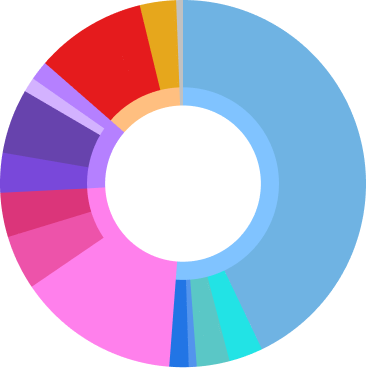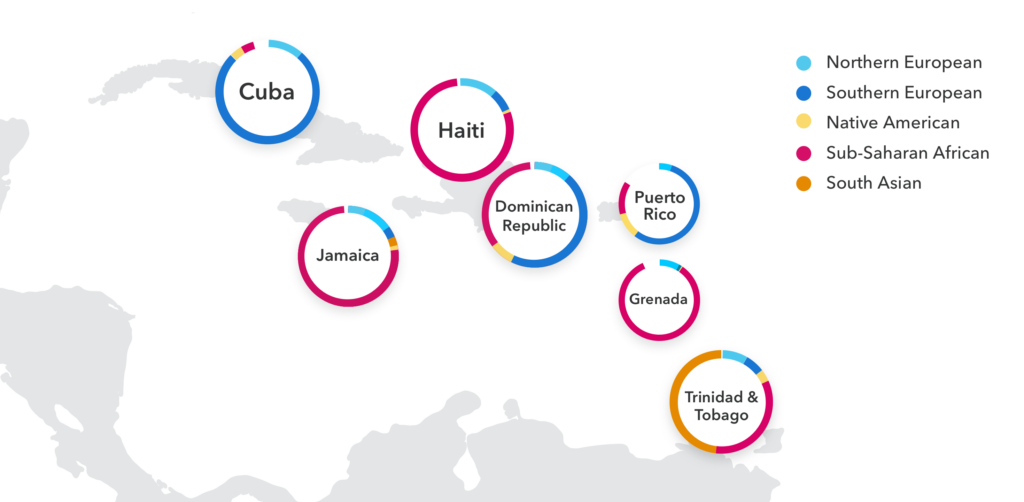This update is currently in the process of rolling out to all eligible customers on the latest, V5, genotyping chip.
The 23andMe Ancestry Team has been working hard on a major update to the Ancestry Composition report, and results are now available! Our goal is to provide the most accurate and meaningful genetic ancestry results in the industry. We ground our models in rigorous science, guided by established population genetics research, to ensure your results are consistent, reliable, and can help guide your personal journey of discovery.
What changes you’ll see
- New granularity in your ancestry percentages: 33 new populations in Europe and 6 in the Americas to explore. Plus we’ve updated our algorithm to eliminate “Broadly” and “Unassigned” categories in the default results view.
- More accurate results: A new state-of-the-art DNA phasing pipeline reduces errors and gives a more accurate estimate of your percentages, even if your ancestry isn’t from Europe or the Americas.
- New features: A new “Version History” section lets you compare your new results to your previous result, and 23andMe+ Premium™ members can also access all previous versions of their results at different confidence thresholds.
This update powers your Ancestry Composition, Ancestry Timeline, Parental Inheritance, DNA Painting, and more.
Our focus for this update
For this update we focused on improving the entire Ancestry Composition pipeline integrating the latest research. Throughout the rounds of development we look at two major metrics: precision and recall. Precision lets us know how often we correctly predict that a piece of DNA is from a specific population. Recall tells us how much DNA from a specific population we can correctly identify. Working to maximize both precision and recall is critical to making Ancestry Composition and other ancestry features as accurate as possible.

The final models in this update had good precision and recall across the new populations, ensuring the accuracy of the ancestry breakdown predictions while also expanding the specificity and granularity of the populations. One example of the improvements gained by this update is the reduced amount of North Asian ancestry predicted for some Indigenous North American customers. You can learn more about the development process and see precision and recall metrics for each population in the Ancestry Composition Guide.
While this update focused on increasing granularity in Europe and the Americas, customers from other parts of the world will still benefit thanks to the improvements to the science and the removal of broadly and unassigned ancestry.
Sign in and check out your new results.
Not yet a 23andMe member? Learn more about what 23andMe has to offer.
Some questions you might be wondering about
Why are certain populations combined?
To define the 78 Ancestry Composition populations, we analyzed the reference datasets, chose candidate populations that appeared to cluster together, and then evaluated whether we can distinguish those groups in practice. Some populations tend to cluster on their own, but most country-level populations overlap to some degree. In these cases, we experiment with different groupings of country-level populations to find combinations that we can distinguish with high confidence. Check out the Ancestry Composition Guide to learn more.
Does this mean that the people in those groups are the same? No. Each group has its own history, culture, and often different languages. These groupings are a reflection of our current genetic understanding and scientific methods, not a statement about cultural identity.
Does this mean DNA that is assigned to these populations is from all groups? Not necessarily. For example, DNA assigned to the Belarusian, Polish & Ukrainian group might mean your ancestors were from one, two, or all three of those country-level populations. Sometimes other information from your DNA, such as your Genetic Groups, might help you identify more specific locations your ancestors may have come from.
Why are some reference panels smaller than before?
A reference panel, or a reference population or reference dataset, is a collection of DNA samples from people with some common connection. We compare your DNA to these reference panels to determine which ancestry most closely corresponds to your DNA. We often use 23andMe research participants who tell us they have four grandparents all born in the same country for reference panels.
However, sometimes when we look at the ancestry prediction for individuals in a reference panel for a specific population a few individuals don’t end up being predicted to have a reasonably large percentage of their DNA from that population. These individuals are considered outliers. As part of this update we systematically reviewed our reference panels around the world to remove these outliers. But don’t worry; even though some reference panels might be smaller, we still check that the models perform as well as (or better than) before for people with ancestry from these regions.
Why is there no Indigenous Caribbean population?
To define a new ancestry population we need reference panels made up of individuals who have deep genetic roots from one place. However, many individuals from the Caribbean are highly admixed (“admixture” refers to places where there was mixing of previously separate populations). This makes it incredibly difficult to identify a sufficient number of individuals with primarily indigenous DNA from the Caribbean. The reference panels for the new Indigenous American populations are almost entirely unadmixed, which is why we are able to provide ancestry percentages for these populations.

So where does Indigenous Caribbean ancestry show up? We tend to see that Indigenous American ancestry in individuals from the Caribbean is spread among several of the new Indigenous American populations (especially North American, Southern Mesoamerican, Central Andean & Amazonian, and Northern Andean).
Does this mean Indigenous Caribbean ancestors came from those places? Not necessarily. It simply means that of the options available today, those populations are the closest genetic match.
Why weren’t other parts of the world updated?
While we would love to be able to make major updates around the world more frequently, each new population requires new reference data and major updates in the prediction models. Throughout the years we have increased the number of populations across the rest of the world; however, we have not updated the populations in Europe since 2012. This update was an important opportunity to provide more detail in Europe and the Americas.
We will continue to work towards providing more specificity and granularity around the world in your ancestry percentages as well as Genetic Groups (keep an eye out over the next few months for new Genetic Groups in Africa), Historical MatchesSM, and other features.
Why did the colors change?
Adding 39 new colors to the color palette was quite the task for the 23andMe Design Team. The team took this opportunity to think about the colors holistically, coming up with a new system that provides a gradient across the world, allowing for nearby populations that are closer together geographically to be represented by more similar colors, while at the same time providing a system that can work for more populations in the future.
Who will get this update?
All customers genotyped on the current (V5) chip and with access to the ancestry service will see this update. A genotyping chip (or array) tests for a fixed set of genetic variants (SNPs) across the genome. Different chip versions (V1, V2, V3, V4, V5, etc.) test for different sets of SNPs. More recent chips often include better coverage for certain populations, recently discovered variants, or better genetic markers that help improve ancestry?composition algorithms or detect health?associated variants.
Ancestry Composition is trained on specific genotyping chip versions, and these latest models were only trained on the latest chip version. The models are incompatible with data from older genotyping chips, as older chips don’t include most of the genetic markers used by these new ancestry models. More recent chip versions are also designed with better coverage for diverse populations.
If you’re on an older chip version (or not sure which chip version you have) learn about chip upgrades here.
What happens if my family deleted data and I want to connect with them?
When you connect with a biological parent through Your Connections, we use the additional information we learn from your parents’ DNA to improve the resolution of your Ancestry Composition results. You will also be able to see the proportions of each ancestry that you inherited from each parent in the Parental Inheritance section in your Ancestry Composition report. If a family member has deleted their account they will need to purchase a new kit and create a new account before you can connect with them.
 Latest News Articles
Latest News Articles Do you have an RSS newsreader? You may prefer to use this newsletter's RSS feed at:
Do you have an RSS newsreader? You may prefer to use this newsletter's RSS feed at: